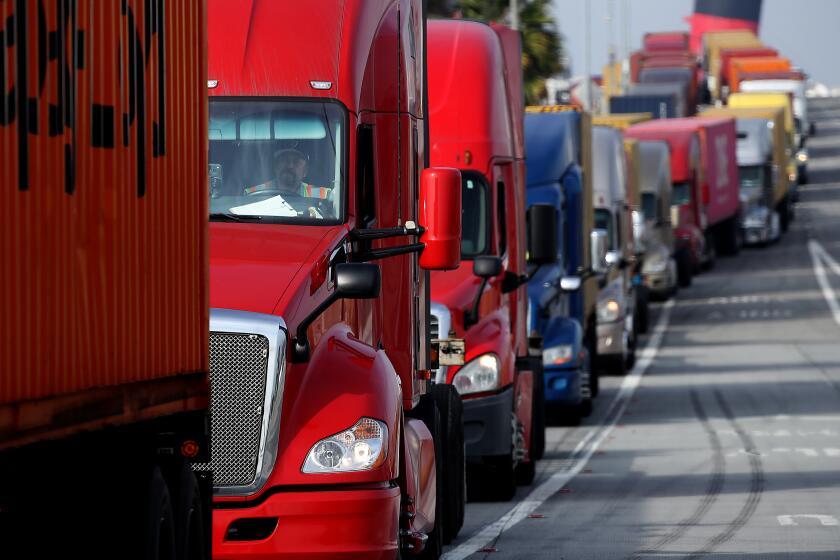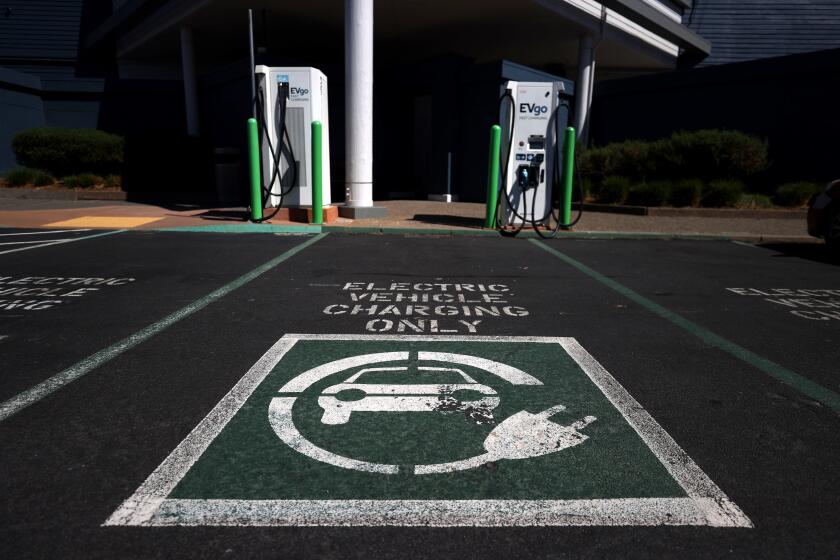Ford Expects Rules, Not Self, to Shift on Hybrid Issue
The saddest American businessmen I ever met were a couple of guys who had drawn the punitive assignment, in the mid-1980s, of marketing big Ford automobiles in Japan. They sat in a desolate Tokyo office, pondering whether it was a mistake to try to sell cars there with their steering wheels on the left, American-style, given that the Japanese drive on the other side of the road.
Ford Motor Co.’s expectation that an entire nation would adjust its habits to suit the company, rather than the other way around, came back to me when I read a letter William Clay Ford Jr. wrote recently to Gov. Arnold Schwarzenegger.
Ford, chairman and chief executive of his namesake company, asked Schwarzenegger to veto a bill -- passed this week by the state Senate and expected to win Assembly approval today -- designed to open carpool lanes to fuel-efficient hybrid cars, even when they transport just one person.
What galls Ford is that the bill wouldn’t apply to his company’s hybrid approach, which is to install mixed gasoline-and-electric drivetrains not in light vehicles, but in vehicles such as SUVs. The bill allows the state DMV to issue up to 75,000 carpool passes to hybrids that achieve fuel efficiency of 45 miles per gallon, a standard comfortably met by Toyota Motor Corp.’s Prius and a couple of Honda Motor Co. models. Because the forthcoming Ford Escape Hybrid SUV will achieve only 36 mpg, Ford says the proposal “amounts to a ‘Buy Japanese’ bill.”
As it happens, Ford lobbyists tried to get the measure amended to reduce the efficiency requirement to 35 mpg. In other words: Rather than make and market hybrids that would meet the bill’s standard, Ford thinks the standard should be adjusted instead.
Bill Ford must know that the Schwarzenegger administration is a co-sponsor of the bill, and that a veto is thus unlikely. Still, he suggests that as it stands, the measure will subject buyers of the Escape Hybrid to manifest injustice.
“How will you be able to tell consumers who purchase this vehicle that they will not be allowed to drive in the carpool lane while other hybrid vehicles can?” he asked.
The answer is easy: Carpool lanes aren’t an infinite resource. The line has to be drawn somewhere, and to allow any hybrid to enter the carpool zone, especially hybrid SUVs that get worse mileage than conventional Honda Civics, would mean crowding it with unworthy vehicles.
“The goal,” notes the legislation’s chief sponsor, Assemblywoman Fran Pavley (D-Agoura Hills) “is to incentivize only clean-air technologies that operate at the highest effectiveness.”
The irony of Ford’s position is that it aligns him with several environmental groups that are unhappy about Pavley’s bill -- for reasons very different from his. They argue, first, that by allowing only 75,000 hybrids into the carpool lanes statewide, the measure would merely cover drivers who already own a qualifying hybrid, have one on order or would be inclined to buy one no matter what. The additional traffic, meanwhile, might overburden many of the carpool lanes that already have been reduced to stop-and-go conditions, such as those located in the Bay Area and Los Angeles County -- coincidentally the regional hot spots for hybrid purchases.
“The potential benefit to the new hybrid owner is really limited,” Stuart Cohen, executive director of the Oakland-based Transportation and Land Use Coalition, told me. Cohen, who fought for several amendments, including one requiring transportation officials to bar hybrids from the state’s most congested carpool lanes, says that providing a new incentive for the purchase of a car with a half-a-year waiting list won’t do much more than allow dealers to charge buyers a fatter premium.
It’s also true that the bill exceeds California’s authority. Because the state’s carpool lanes have been largely built with federal money, a congressional waiver is needed before single-occupancy hybrids can cross the velvet rope. (A measure allowing the change died in Congress this year.)
In his own brief, however, Ford doesn’t express too much solicitude for the carpool lane. For him, the issue is mostly the protection of Ford Motor’s marketing strategy.
This is about the only tack he can take, given his company’s treatment of hybrid technology over the years. Nothing prevented Ford or any other Detroit automaker from developing hybrids that matched Japan’s for fuel efficiency. But while the Japanese started testing the U.S. market with hybrids in 1999, Detroit sat on its thumbs, lulled by the assumption that Americans would never pay a premium for green cars. The queues and jacked-up dealer margins that soon emerged for the Prius must have given the American manufacturers some doubts, so years later, here’s the harvest: A flowering crop of hybrid SUVs.
A Ford spokesman says this is proper, because it recognizes that SUVs are a core part of the domestic car buying base. Addressing that market will ensure the broadest acceptance of the novel hybrid technology, he adds. Well, maybe. But it shouldn’t be lost on anyone that the profit margins are a lot bigger on SUVs than they are on two-door runabouts.
Bill Ford’s complaint underscores the futility of trying to entice American automakers into socially useful policies through a method that dog trainers would call positive reinforcement. “He ought to try to figure out how to compete with the Japanese in building the most efficient cars for California,” says State Treasurer Phil Angelides, one of the bill’s creators.
That would be one way of showing that the people who run Ford Motor are the tough, smart leaders they like to think they are, rather than -- dare I say it? -- a bunch of girlie men.
Golden State appears every Monday and Thursday. You can reach Michael Hiltzik at golden.state@latimes.com and read his previous columns at latimes.com/hiltzik.




